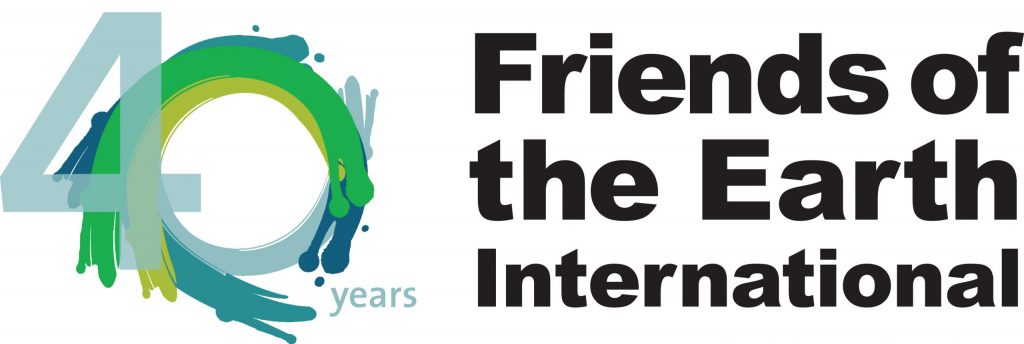by Nnimmo Bassey
Chair, Friends of the Earth International
Milestones are important landmarks that prompt us to take time out to remember and reflect on what we have achieved, as well as to prepare for the challenges ahead. After forty years of campaigning, Friends of the Earth International can certainly look back on its contribution to the quest for environmental and social justice with quiet but considerable satisfaction.
To highlight just one area, over the past decades we and our allies have successfully campaigned for a raft of intergovernmental agreements regulating the disposal of wastes, and the use of chemicals such as pesticides and ozone-depleting substances. It now seems inconceivable, for example, that countries once dumped their nuclear waste at sea, and that there were no controls over even the most lethal chemicals that persist and bio-accumulate in people and in nature. Environmental concerns such as these are now considered to be part of the everyday political discourse in many countries.
But we also recognise that our work is far from done. New and emerging challenges driven by the current neoliberal economic model require a strong, integrated and innovative response. Our ecosystems are at breaking point: forests and biodiversity are disappearing, climate change is heating up the planet, and land and water resources are being polluted by oil, mining and gas exploration. Communities and countries across the world have also been rocked by financial, food and energy crises.
On our 40th anniversary we salute those who, inspired by their dream of an international environmental network, created Friends of the Earth International, now a large and influential federation of autonomous environmental groups capable of addressing these crises. We give thanks to the small, dedicated and determined group of environmental activists from France, Sweden, the UK and the US, who met in Roslagen, Sweden, on 15 June 1971: this meeting was to be the first of many passionate intercultural exchanges of concerns and ideas over the next four decades.
Originally a northern-based environmental organisation, Friends of the Earth International grew and evolved as many more member groups, especially from the Global South, joined us in the 1980s and 1990s. Friends of the Earth International now boasts 76 national member groups around the world. We have more than 2 million members and supporters, and have joined forces with farmers, fisherfolk, Indigenous Peoples, women, workers and young people, in our struggle for a better world.
We believe that real success can only be achieved if the underlying causes of problems are challenged. Settling for solutions that only deal with the short-term symptoms is pointless. Thus we cut to the heart of the matter: the single-minded determination of corporations, governments and international financial institutions like the World Bank to put short-term economic concerns and corporate welfare before the long-term health and well-being of the planet and its people. This upside-down approach to our future, our children’s future, and the future of the ecosystems around us, simply cannot continue.
Thus Friends of the Earth International is committed to challenging the neoliberal model underpinning this short-sighted, profit-oriented perspective. We do so in many different ways, from the local level through to the international. We work with local communities to defend their rights and promote food sovereignty and community-forest management, for example. We are also well placed to mobilise people to pressure governments at the national level too, regardless of whether we are opposing bad decisions or proposing important new laws.
But we also have the muscle to show up en masse at important environmental and economic summits – on climate change or international trade for example – to make sure that the world’s governments are aware of the impacts that their decisions may have on the daily lives of people and the environment, and to let them know what people around the world really think about these issues. We will continue to track and challenge the activities of specific corporations, such as Monsanto or Shell, and will take them to court if necessary.
Challenging such powerful interests is a dangerous business. Over the past forty years, some of our members have paid a heavy price for their activism, including the abuse of their rights, imprisonment, beatings, disappearances and even death. But Friends of the Earth activists can count on their friends and allies around the world for support in their campaigns for the environment and for people.
Friends of the Earth International’s slogan is: mobilise, resist, transform! Firstly, effective resistance is impossible without widespread mobilisation. Commercial interests and political inertia are hard to shift, and people power is an absolute prerequisite for real and enduring change. Secondly we must harness our energies to resist the exploitation of people and their environments, together with our allies including social movements and local communities around the world. And thirdly, we must promote the emergence of democratic structures, systems and processes in order to facilitate the transformation to sustainable and just societies. We are not only whistleblowers, we help to create solutions and real alternatives to business-as-usual.
The FoEI federation is hugely diverse, and this diversity gives us our strength. We are a kaleidoscope of different member groups – big and small, northern and southern, old and new – and all with different concerns, styles, structures and processes. This gives the network a truly creative and energetic dynamic and leads to powerful and multidimensional campaigns. It provides us with access to a treasure trove of knowledge systems and wisdom and inspires new ideas and concepts as well.
We are committed to building a movement for a new and better world built on solidarity, rather than competition and destruction. Today, in our fortieth year, we stand strong and proud with people around the world struggling for environmental justice and for the change we urgently need.





